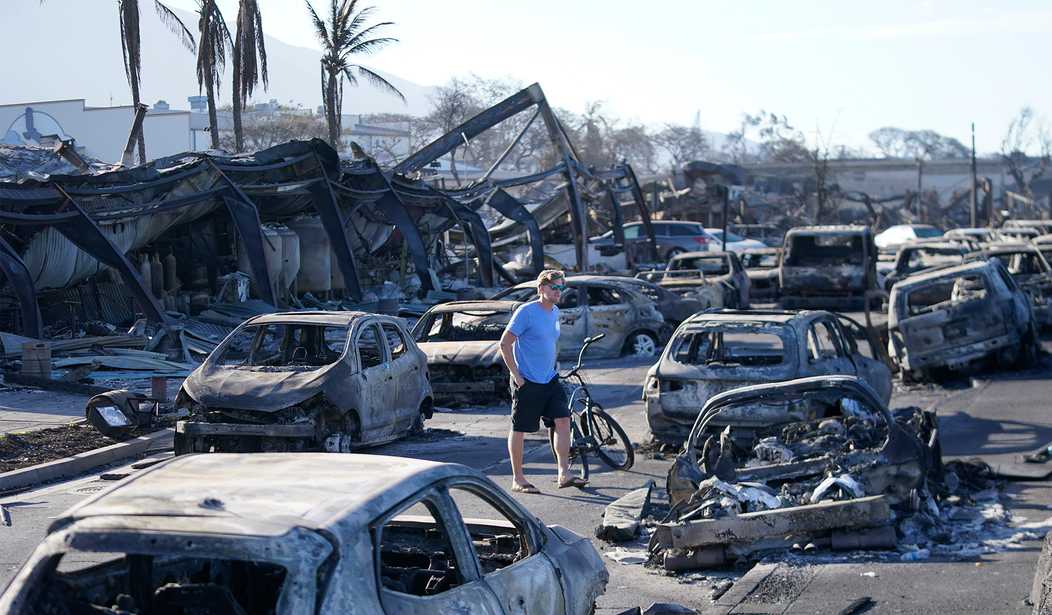Top News
Was the Maui wildfire caused by cable television?

At first glance, the title question may sound a bit on the silly side. And don’t be terribly surprised if it still sounds silly after a second or third glance. But it’s a question that is being asked in a serious fashion in court in Hawaii this month. Attorneys for a number of residents and businesses impacted by the wildfire that destroyed Lahaina are claiming that cable television and telephone companies bear some responsibility for the fire and should be held accountable as part of a class action suit they are bringing. Their reasoning is that the television and telephone cables were stretched too tightly between the phone poles, causing additional stress that led to the poles snapping in the hurricane-force winds. The resultant collapse caused sparks which touched off the wildfire and all of the subsequent destruction. But is that even possible? (Associated Press)
After a visit to a warehouse where Hawaiian Electric Company is housing power poles and electrical equipment that may be key to the investigation of last month’s devastating fires on Maui, lawyers for Lahaina residents and business owners told a court Tuesday that cable TV and telephone companies share responsibility for the disaster because they allegedly overloaded and destabilized some of the poles.
The lawyers said the cables were attached in a way that put too much tension on the poles, causing them to lean and break in the winds on Aug. 8 when flames burned down much of Lahaina, killing at least 115 people and destroying more than 2,000 structures.
LippSmith LLP has filed a proposed class action against Hawaii’s electric utility and Maui County in state court in Hawaii.
From everything we learned in the aftermath of the fire, it does appear that investigators are satisfied that the blaze was initially caused by sparks from damaged powerlines, but it happened in two stages. A small blaze was initially reported by Hawaii Electric and firefighters responded and extinguished it. Or at least they thought they did and they declared the situation under control and left. Then it either flared back up or a second sparking event started a new blaze. It’s not entirely clear which way it happened.
For the sake of argument and to give these attorneys a fair shake, let’s assume for the moment that a spark from a falling set of poles and powerlines started the blaze, which is a reasonable enough scenario. Could the tension and lack of slack in the telephone and cable TV lines really cause the poles to be more prone to snapping and falling? Those poles weren’t just installed this year. They’ve reportedly been there for quite a while. Shouldn’t some of them have fallen by now? Or at the very least, shouldn’t someone who inspects them have noticed? (While writing this, I went outside to look at the lines near my house and both the power lines and the cable TV lines are very nearly straight as a rail with almost no slack. This seems rather common.)
While never having worked professionally as a lineman, I do have a bit of experience in this area and another question comes to mind immediately. Let’s just say that the line tension was an issue and it could have brought down the poles (instead of the massive winds bringing them down). Where would the sparks come from? Cable television lines and telephone lines don’t really have much in the way of electrical current going through them. They are signal lines with periodic amplifiers installed along the route. The real current travels through the AC power lines. That’s where you would get your sparks if they were approaching the ground, particularly if it was wet outside. So it’s even harder to see how the cable and telephone companies would be potential guilty parties here.
Also, if we believe that the lines were installed under too much tension, who installed the lines? When there are issues, I do see the cable TV company send workers around to do maintenance and repairs. but when lines are being disconnected or replaced, it’s the power company that does the work. Perhaps it’s different in Hawaii. I couldn’t find a specific reference to that while researching the question because the subject is a fair way down in the weeds.
If anyone is at fault in this aside from an Act of God (and that’s still a significant “if” in my opinion) it’s Hawaii Electric. But they are a private utility company that may declare bankruptcy if they are hit with an avalanche of lawsuits. This sounds a lot like a group of class action attorneys who are trying to round up the biggest collection of targets with the deepest pockets that they can in the hopes of scoring a major windfall. (No pun intended.) I am prepared to stand corrected if more and better evidence is brought forward, but this just doesn’t make a lot of sense to me.
Read the full article here

-
Uncategorized5 days ago
The Surge of Crypto Slots: A New Period in Online Pc Gaming
-
Uncategorized5 days ago
Kəşf Etmək Binance Coin Kazino Saytları Dünyasını
-
Uncategorized5 days ago
The Increase of Dogecoin Casino Sites: An Extensive Introduction
-
Uncategorized5 days ago
High Roller Online Casinos: Inside the Globe of Elite Betting
-
Uncategorized1 day ago
The Comprehensive Overview to Tutoring Networks







